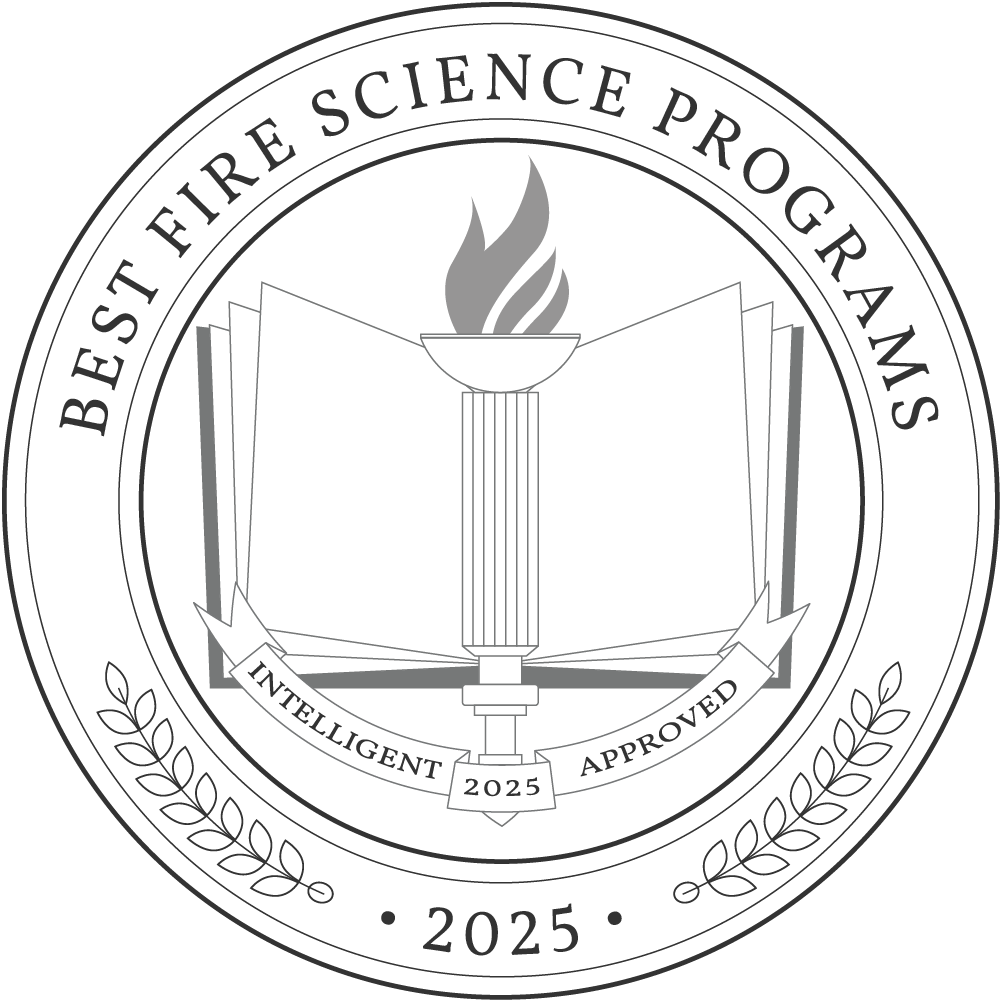Firefighters are highly trained to put out fires — but that’s not all they do. After finishing a degree in fire science, fire service professionals can manage emergencies, assess risk to protect life and property, maintain fire prevention tactics, research and implement fire safety technology, and lead fire safety and emergency personnel teams. In 2023, firefighters earned a median annual wage of $57,120, and fire inspectors and investigators earned $74,160.
Fire science programs offer associate, bachelor’s, and master’s degrees with varying specializations. In 2023, the average cost of an associate degree in fire science was $3,885 annually, and a four-year bachelor’s degree cost $17,709 per year. Students who went on to earn master’s degrees in fire science paid an average of $20,513 per year.
Why Trust Us
The Intelligent.com Higher Education Team is dedicated to providing students with independent, equitable school and program rankings and well-researched resources. Our expert-driven articles cover topics related to online colleges and programs, paying for school, and career outlooks. We use data from the U.S. Department of Education’s College Scorecard, the National Center for Education Statistics, and other reputable educational and professional organizations. Our academic advisory team reviews content and verifies accuracy throughout the year for the most current information. Partnerships do not influence rankings or editorial decisions.
- Analyzed over 2,000 national, accredited, and nonprofit colleges and universities
- 800+ rankings pages are reviewed and updated yearly
- Content is informed by reputable sources, surveys, and interviews with academic advisors and other experts
- Over 100 data points are reviewed for accuracy and quality throughout the year, including sources
How we rank schools
Our list features the best Fire Science degree programs at top colleges nationwide. Each school featured is a nonprofit, accredited institution — either public or private — with a high standard of academic quality for post-secondary institutions.
We evaluated each school’s program on tuition costs, admission, retention and graduation rates, faculty, reputation, and the student resources provided for online students. We collected data from trusted sources like the National Center for Education Statistics, individual school and program websites, school admissions counselors, and other data sources. Then, we calculated the Intelligent Score on a scale of 0 to 100 based on the following criterion:
Academic Quality:
- Admission rate versus enrollment rate
- Retention rate of students who return after year one
- Accreditation status (regional and programmatic)
- Nonprofit status, both private and public institutions
Graduation Rate
- Overall graduation rate
- Total number of currently enrolled students, including diversity metrics
- Student-to-faculty ratio
Cost and ROI
- In-state and out-of-state per-credit tuition rates and fees
- Required credits to graduate
- Earning potential after graduation
- Availability of federal student loans, scholarships, and other financial aid options
Student Resources
- Available student services for online-only and hybrid programs
- On-campus amenities like tutoring centers and the number of libraries
Read more about our ranking methodology.
Best 13 Accredited Fire Science Degree Programs
FiltersInstitution Type
Status
- Intelligent Score
- Alphabetically By University Name
- Acceptance Rate
- Enrollment
- In-state Graduate Tuition
- Out-of-state Graduate Tuition
- In-state Undergraduate Tuition
- Out-of-state Undergraduate Tuition

University of Florida
Intelligent Score: 98.82In-state: $4,477
Out-of-state: $25,694
In-state: $10,770
Out-of-state: $10,770
SAT: 1290-1460
ACT: 29-33
In-State: $212
Out-of-State: $955
On-Campus, Online
Southern Association of Colleges and Schools, Commission on Colleges
120

University of Nebraska at Omaha
Intelligent Score: 97.91In-state: $7,770
Out-of-state: $24,900
In-state: $6,138
Out-of-state: $6,138
SAT: 1110-1320
ACT: 22-28
In-State: $243
Out-of-State: $764
On-Campus, Online
Higher Learning Commission
120

University of North Carolina at Charlotte
Intelligent Score: 97.69In-state: $7,019
Out-of-state: $34,198
In-state: $10,552
Out-of-state: $10,552
SAT: 1280-1490
ACT: 28-33
In-State: $189 - $348
Out-of-State: $800
On-Campus
Southern Association of Colleges and Schools, Commission on Colleges
120

New Jersey City University
Intelligent Score: 95.16In-state: $12,676
Out-of-state: $22,826
In-state: $13,598
Out-of-state: $13,598
SAT: N/A
ACT: N/A
$459
On-Campus
Middle States Commission on Higher Education
120

Lake Superior State University
Intelligent Score: 95.13In-state: NA
Out-of-state: NA
In-state: NA
Out-of-state: NA
SAT: 920-1150
ACT: 19-26
$582
On-Campus
Higher Learning Commission
124

John Jay College
Intelligent Score: 93.99In-state: $32,657
Out-of-state: $40,607
In-state: $40,813
Out-of-state: $40,813
SAT: 920-1060
ACT: 17-21
In-State: $305
Out-of-State: $620
On-Campus
Middle States Commission on Higher Education
120

Fayetteville State University
Intelligent Score: 90.73In-state: $2,982
Out-of-state: $14,590
In-state: $3,438
Out-of-state: $3,438
SAT: 840-1000
ACT: 16-20
In-State: $41 Out-of-state: $208
On-Campus, Online
Southern Association of Colleges and Schools, Commission on Colleges
120

Western Illinois University
Intelligent Score: 89.59In-state: $8,712
Out-of-state: $8,712
In-state: $8,156
Out-of-state: $8,156
SAT: 880-1090
ACT: 18-24
In-State: $336
Out-of-State: $588
On-Campus
Higher Learning Commission
120

University of New Haven
Intelligent Score: 89.29In-state: $40,170
Out-of-state: $40,170
In-state: $17,370
Out-of-state: $17,370
SAT: 1050-1220
ACT: 22-28
$1,470
On-Campus
New England Commission of Higher Education
122

Anna Maria College
Intelligent Score: 87.72In-state: $36,920
Out-of-state: $36,920
In-state: $10,530
Out-of-state: $10,530
SAT: N/A
ACT: N/A
$795
On-Campus, Online
New England Commission of Higher Education
121

Hampton University
Intelligent Score: 86.97In-state: $26,198
Out-of-state: $26,198
In-state: $13,099
Out-of-state: $13,099
SAT: N/A
ACT: N/A
$290
On-Campus
Southern Association of Colleges and Schools, Commission on Colleges
122

Idaho State University
Intelligent Score: 86.74In-state: $5,928
Out-of-state: $22,550
In-state: $7,982
Out-of-state: $7,982
SAT: N/A
ACT: N/A
In-State: $351
Out-of-State: $951
On-Campus
Northwest Commission on Colleges and Universities
120

Salem State University
Intelligent Score: 85.39In-state: $910
Out-of-state: $7,050
In-state: $2,520
Out-of-state: $2,520
SAT: N/A
ACT: N/A
In-State: $38
Out-of-State: $294
On-Campus
Southern Association of Colleges and Schools, Commission on Colleges
120
How to Choose a Fire Science Degree Program
Choose your area of study
Fire science programs range from general studies of fire science to more specialized programs, including degrees in fire science technology or emergency management. Your area of study largely depends on your preferred coursework, academic skills, and career goals.
One of the most common degrees for a firefighter is an Associate of Science in fire science. It incorporates general education with a concentration in fire safety, best practices in emergencies, and risk assessment in firefighting. Students interested in a leadership role in emergency services can complete a Bachelor of Science in fire science.
For a fire science degree focused on engineering and technology, students can earn an Associate of Science in fire science technology or a Bachelor of Science in fire and safety engineering technology. If you’re interested in a senior leadership career in fire science, such as a fire marshal or fire inspector, consider a program that offers a Bachelor of Science in fire protection administration.
Postgraduate fire science degree programs prepare students for specialized careers in fire science. Graduates apply previous firefighting experience to a Master of Science in fire management or a Master of Science in emergency services administration to become fire chiefs or fire marshals. Firefighters interested in criminal justice can transition to roles in fire investigations with a Master of Science in arson and incident investigations.
Research schools and programs
Choose an accredited school and fire science program to ensure you receive a high-quality education. Institutional accreditation agencies like the Higher Learning Commission regularly assess schools, including their adherence to academic educational standards and allowing students to transfer credits to other accredited schools. Programmatic accreditation agencies, such as the International Fire Service Accreditation Congress and the Accreditation Board of Engineering and Technology, determine whether a specific fire science program adequately prepares its students for success in the professional world.
Prepare for tests and applications
Undergraduate fire science degree programs may require students to take entrance tests, such as the SAT and ACT, before applying. Graduate fire science programs often require applicants to take the Graduate Record Examination (GRE) as an entrance test.
Many fire science degree programs also require students to have emergency medical technician (EMT) certificates, transcripts showing completion of a high school degree or equivalency, such as the General Educational Development (GED) test, and evidence of professional experience in emergency services.
Select your program
For a general fire science degree focusing on prevention and safety, choose fire science programs in a school’s College of Natural and Social Sciences or College of Forensic Sciences. Fire science degrees from the College of Criminal Justice and Emergency Responders offer interdisciplinary coursework in medicine and criminology, while fire science programs offered through the College of Engineering provide opportunities to study and implement the latest fire safety technology.
Once you’ve narrowed down your list of programs, take in-person or virtual tours of the selected schools. Talk to students in the fire science program and admissions counselors about what the school offers incoming students, including housing, scheduling needs, and more.
Determine how you’ll pay for your degree
Start your research on financial aid with the Free Application for Federal Student Aid (FAFSA). It tells you how much financial assistance you can apply toward the costs of your fire science degree program. Contact your school’s financial aid office for more assistance opportunities, including scholarships, grants, and programs like employer tuition assistance for those already in the workforce.
What Can You Expect From a Fire Science Degree Program?
A fire science program combines classroom instruction and on-the-ground training to prepare students for the mental and physical demands of a career in fire science. Students complete coursework, work with groups in a cohort model, and participate in simulation disaster situations.
They also concentrate on physical fitness to prepare for the Candidate Physical Ability Test (CPAT), which assesses students’ ability to physically navigate real-world firefighting situations. Most fire departments require candidates to have passed the CPAT no more than six months before applying for a firefighting job.
Potential courses you’ll take in a fire science degree program
- Fire Safety. Students learn about different types of fires, including wildfires and structure fires, as well as emergency preparedness, action plans, fire hazards, rescue strategies and techniques, and controlling a fire scene.
- Fire Behavior. In a fire behavior course, students study how fires start and behave in different environments. They use concepts from chemistry and biology to predict how a fire will behave and what extinguishing agents are most effective.
- Construction. Future firefighters learn about building codes, materials, regulations, and firefighting best practices. They apply what they learn to hands-on simulations involving various structures and discuss these concepts with construction professionals.
- Disaster Response. A disaster response course teaches students about predicting and preparing for natural and human-caused disasters. Students apply a fundamental understanding of public policy to analyze past response plans to disasters and formulate their own.
Fire Science Degree Frequently Asked Questions
How do I apply to a fire science degree program?
Refer to your school’s fire science program website for specific application requirements. It will list deadlines, prerequisites, and application materials you should gather before applying for the next academic year. Consult the admissions office at your school for more information about applying to their fire science program.
How much does a fire science degree cost?
In 2023, tuition and fees for an associate degree in fire science cost an average of $3,885 per year. A bachelor’s degree in fire science was $17,709, and a master’s degree averaged $20,513 annually. Consider other expenses in your budget, such as housing, educational materials, test preparation programs, transportation, and the cost of living in your school’s town.
How long does it take to earn a fire science degree?
Associate degrees in a fire science program require students to take around 30 to 60 credit hours, which students typically complete in two years. Students can earn a bachelor’s degree in fire science by completing 120 credit units in four years and advance to a master’s degree with an additional 30 to 60 units in two years.

